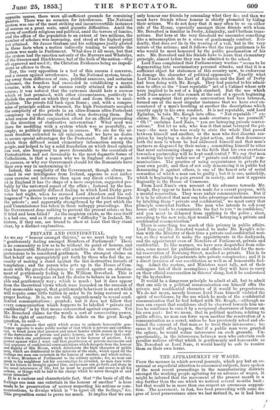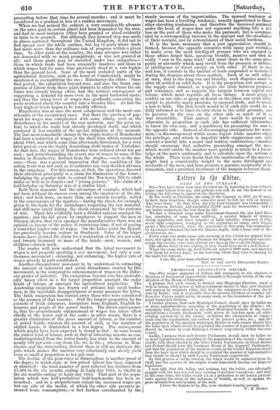THE APPRAISEMENT OF WAGES.
FROM the manner in which several journals, which pay but an oc- casional or superficial attention to economical subjects, have spoken of the most recent proceedings in the manufacturing districts amongst the working people agitating for an advance of wages, it might be inferred that the movement of the present month is a step further than the one which we noticed several months back : but that would be in more than one respect an erroneous supposi- tion. The movement, in fact, has been proceeding with some de- gree of level perseverance since we last noticed it, as it had been
proceeding before that time for several months ; and it must be considered as a gradual in lieu of a sudden movement. When we last noticed the subject, a very considerable advance on the rates paid in certain places had been demanded by the men, and had in most instances either been granted or stood evidently in train to be granted. But although that forward step was made in places scattered throughout the United Kingdom, it did not in fact spread over the whole surface, but lay in parts where trade had made more than the ordinary rate of progress within a given time. In other parts of the country, the same advance was either not demanded with so much promptitude, or was not granted at all; and these parts may be classified under two categories,— those in which trade had been unusually inactive, and those in which wages had for some time previously stood at a rate higher than the general level. Some of the more secluded parts of the agricultural districts, such as the heart of Cumberland, might be mentioned as exemplifying the one ; Manchester the other. Since that period, the emigration beyond seas, and also the home emi- gration of labour from those quiet districts to others where the ad- vance was already taking effect, had the natural consequence of suggesting a demand for more even in the most backward spots ; and thus the rising level of wages was gradually converting the pools scattered about the country into a broader lake. At last the very highest levels began to be sensibly affected. Manchester was at once the most conspicuous and the most con- siderable of the exceptional cases. But there the question of pay- ment for wages was complicated with some others, such as the disturbance in the market of the raw material, and the great ex- tent to which the trade had already developed itself, and which rendered it less sensible of the special stimulus at the moment. The last most remarkable change in the staple trades of Manchester had been a reduction of wages at the slack time which commenced about 1848, and which some time afterwards threatened, for a very brief period, even the highly flourishing cloth-trades of Yorkshire. At that date, the wages of Manchester were reduced about ten per cent ; and notwithstanding the recent rise of wages in some of the trades in Manchester, distinct from the staples,—such as the ma- sons,—there was a general impression that the condition of the cotton trade was not such as to authorize any very decided advance in the outgoings. For this reason, at first, the operatives directed their attention principally to a claim for diminution of the hours ; indulging the popular wish to extend the Ten-hours Bill to adult males as well as to females and" young persons." The claim of a half-holyday on Saturday was of a similar kind.
Both these demands had the advantage of example, which had not been without its success even among the employers of the dis- trict; and both were, on more than one occasion recently, suited to the convenience of the masters,—during the cheek, for example, given to the trade by the disturbance respecting the raw material, and still more lately during the check occasioned by the portents of war. There has evidently been a divided opinion amongst the masters ; and the aid given by employers to support the men at Glossop shows, that even amongst the manufacturers there was an opinion in favour of the policy of restricting time, if not of paying a somewhat higher rate of wages. On the latter point the dispute has practically become serious in Stockport. Some of the larger houses have resisted the claim for a restoration of the ten per cent, and twenty thousand or more of the hands—men, women, and children—struck work.
The reader will now understand that the latest movement in wages is not properly speaking a new movement, but only a con- tinuance movement ; enforcing, not enhancing, the higher rate of wages already in part established. Another circumstance necessary to be understood in estimating the amount of industrial and social disturbance created by this movement, is the comparative enhancement of wages in the differ- ent grades of industry. The emigration beyond seas has undoubt- edly taken effect in a far larger proportion amongst the ruder kinds of labour, or amongst the agricultural population. The Australian emigration has drawn out artisans and small trades- men, to the inevitable disappointment of many amongst the latter. The Irish emigration has carried away those who were considered as the yeomen of that country. Still the largest proportion by far consists of Irish labourers, navigators from England, English la- bourers and people of the poorer trades. The direct consequence is thaethe proportionate enhancement of wages has taken effect chiefly at the lower end of the scale; in other words, there is a greater diminution of the gross amount of labour, or the number of naked hands, whereas the amount of skill, or the number of skilled hands, is diminished in a less degree. The consequence which might have been expected is found in fact : in some towns the rudest kind of labour, such as that of labouring masons as con- tradistinguished from the better hands, has risen to the amount of nearly 100 per cent—say from 12s. 6d. to 24a.; whereas in Man- chester and the surrounding district there is still an obstinate dis- pute which makes the masters very reluctantly and slowly yield even so small a proportion as ten per cent.
The decline of the poor-rates in Birmingham is another proof of the degree to which rude or low-priced labour has been removed or absorbed : the total number of poor relieved has declined from 37,304 in the six months ending at Lady-day 1848, to 10,302 in the six months ending at Lady-day 1853. That part of the popu- lation which was half-productive half-burdensome has been retrenched; and to a proportionate extent the increased wages are
but one side of the medal, of which the other side presents in- creased home consumption,—a fact further corroborated by the steady increase of the import-tables. The upward tendency of wages has been a levelling tendency, exactly apportioned to those other elevating tendencies ; and therefore the increased payment under the head of wages does not represent anything like a net loss on the part of those who make the payment, but is accompa- nied by a corresponding increase in the amount and the steadiness of their receipts, and by retrenchment of their social burdens.
It is the more necessary that a just appreciation should be formed, because the opposite conspires with many past mistakes to make even the most intelligent persons who are engaged in these affairs forget that, speaking broadly, masters and men do really "row in the same boat," and must share in the same pros- perity or adversity which may result from the presence or absence of intelligence to direct energy on both sides. If there is any real loss, it consists in the amount of trade suspended or destroyed during the disputes about these matters. Each of us will admit at once, that in the long run and broadly, such disputes must be after all settled on solid facts. It is the proportion and nature of the supply and demand, as respects the trade between producer and consumer, and as respects the bargain between capital and labour, which must regulate all these things. A mere grasp of avidity on one side, or grasp of denial on the other, can avail little, except to provoke angry passions, to suspend trade, and to create a loss to both. The best result would be if each side could be so fully informed as to limit its own claim to the solid grounds, and to perceive in the case on the other side so much of it as was irresistible. That arrival at facts would be prompt or otherwise in proportion as each side has sufficient information to know its own case, and a machinery for presenting its ease to the opposite side. Instead of discouraging combinations for work- men,—a discouragement which seems unjust while masters enjoy the privilege, and which is impolitic while suppression can only convert a lawful into a secret and lawless combination,—masters should encourage that collective proceeding amongst the men, which would enable the masters most quickly to attain to a know- ledge of the men's sentiments and to calculate upon the actions of the whole. There is no doubt that the countenance of the masters might lend a considerable weight to the more intelligent and moderate of the men, and thus promote a genuine reciprocity of in- formation, and a practical treatment of the bargain between them.



























 Previous page
Previous page